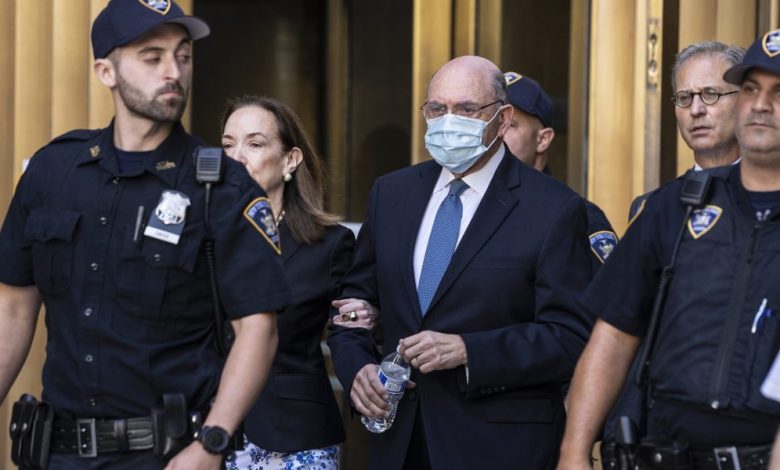Allen Weisselberg was demoted from Donald Trump’s office floor and given a small birthday cake after agreeing to testify against the Trump Organization

The senior executive at the Trump Organization, who is set to face charges of criminal tax fraud, told the jury that shortly after he pleaded guilty, the firm rescinded his title and kicked him out of the prestige floor where Donald Trump worked.
Former CFO Allen Weisselberg, the prosecution’s key witness in the trial of two Trump companies, took the stand on Tuesday in a Manhattan state court wearing a charcoal gray suit and blue tie. Weisselberg, 75, said after he filed his plea in August and agreed to testify against the companies – who are accused of hiding taxable income in luxurious perks – his title was reduced to senior adviser.
“My location has changed as well,” he told the jury when questioned by Assistant District Attorney Susan Hoffinger, explaining that he lost his seat on the 26th floor of Trump Tower and was moved down one floor. He then described a party that Trump Organization executives nevertheless threw for him.
“To my great regret,” Weisselberg said, “my son wanted to make sure I had a birthday party” and arranged it at Trump Tower.
“It was a little birthday cake,” he added.
But even after pleading guilty to the entire 15-count charge against him, including conspiracy and tax fraud charges, Weisselberg is still collecting his full salary of $640,000 and is hoping to get his $500,000 bonus in January to collect, he told the jury.
How Perks Worked
Prosecutors are trying to show that the alleged tax fraud scheme at the Trump companies was not hatched in secret by Weisselberg and controller Jeffrey McConney, as the defense claims, but is part of the firm’s ingrained business practices. Trump himself, who is not charged, has described the trial as an unfounded vendetta.
On his first day on the stand, Weisselberg presented a stark contrast to McConney, the prosecution’s first witness, who faltered and was so evasive that the judge declared him a hostile witness Monday, giving prosecutors more leeway in questioning gave. Weisselberg, on the other hand, seemed comfortable telling the judges how he received perks and bonuses.
Weisselberg said he received a number of benefits totaling about $1.7 million, including an apartment with a garage and his and her Mercedes-Benz vehicles. He testified that he also received undeclared cash and covered various personal expenses for his homes and his son’s apartment, including flat-screen TVs and new furniture. These items should have been taxed as income.
Between 2005 and 2017, Trump Corp., one of the two companies on trial, paid nearly $1.2 million in rent for an apartment for Weisselberg and his wife, according to prosecutors. Weisselberg told jurors Tuesday the benefit came about after his wife fell ill and moved to Florida. Trump offered him an apartment on Manhattan’s Upper West Side to be closer to the office, he said.
“Donald knew I was going home to an empty house and nobody was there,” Weisselberg said in court. “He said, ‘Move into town instead of spending three hours on the train.'”
Trump later personally paid about $359,000 in private school fees for Weisselberg’s grandchildren, prosecutors said.
Why no raise?
Hoffinger asked Weisselberg why he didn’t just ask for a raise. Weisselberg said he was helping the company save money.
“In order to get a raise, Trump Corp. had to pay double the amount because taxes would have been withheld,” he said.
Under the terms of his plea agreement, Weisselberg must testify truthfully and, according to his attorney Nicholas Gravante, hopes to be sentenced to just 100 days in prison instead of the maximum 15 years he could otherwise face. He will continue his testimony on Thursday when the trial resumes.
Sign up for the Fortune Features Email list so you don’t miss our biggest features, exclusive interviews and investigations.



